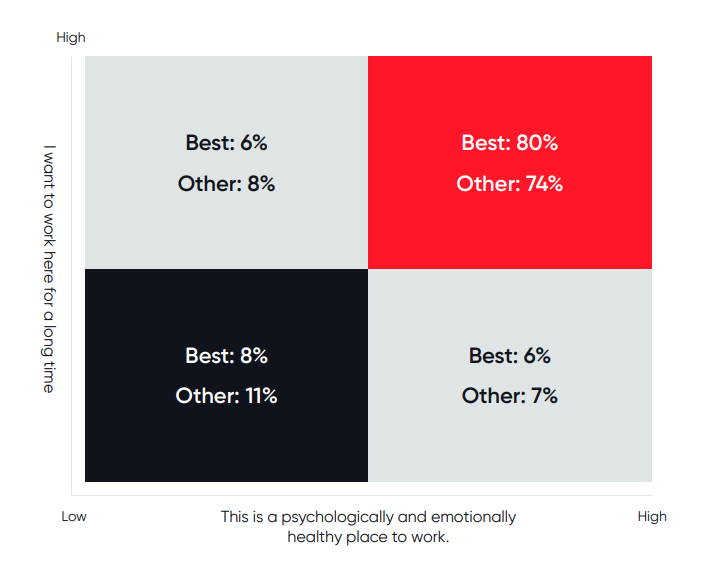Reading Time: 5 minutes
Belonging is a fundamental human need that drives our desire to connect with others, form relationships, and feel part of a group or community. When individuals feel a sense of belonging, they experience greater levels of happiness, life satisfaction, and overall well-being. This need is equally important in the workplace, where employees who feel a sense of belonging are more engaged, productive, and committed to their organization. In this blog post, we will explore the relationship between belonging and employee well-being, with a specific focus on addressing burnout and promoting resilience in the workplace.
The Importance of Belonging in Employee Well-being
Our recent Wellbeing: The Indisputable Superpower research report has shown that employees who feel a sense of belonging in their workplace experience higher levels of well-being and job satisfaction. When individuals feel connected to their colleagues and the organization as a whole, they are more likely to be engaged in their work, feel valued and respected, and have a positive outlook on their future within the company. In contrast, employees who do not feel a sense of belonging are more likely to experience stress, anxiety, and burnout, which can negatively impact their overall well-being.
Understanding Burnout: Causes and Consequences
Burnout is a growing concern in today’s fast-paced, high-pressure work environments. Burnout is a state of emotional, physical, and mental exhaustion caused by prolonged exposure to job-related stressors. Our report shows that only 15% of employees experience burnout in companies in the top-quartile as compared to 39% in the bottom-quartile. The causes of burnout can be multifactorial, including excessive workload, lack of control over work, poor work-life balance, and interpersonal conflict with colleagues. The consequences of burnout can be significant, including reduced work performance, decreased job satisfaction, and increased absenteeism.

How Belonging Can Help Address Burnout
Workplace wellness is inversely proportionate to employee burnout, as top quartile companies with increased workplace wellness saw a decrease in burnout, while bottom quartile companies with decreased workplace wellness saw an increase in burnout. Belonging can play a critical role in addressing burnout in the workplace. When employees feel a sense of connection and belonging with their colleagues and the organization, they are more likely to experience positive emotions, which can counteract the negative effects of stress and burnout.
Additionally, belonging can provide a sense of support and encouragement, helping employees to cope with the demands of their job more effectively. This support can come in the form of social support, emotional support, or practical support, such as assistance with workload management.
Promoting Resilience Through Belonging
Resilience refers to an individual’s ability to bounce back from adversity and cope with stress in a positive way. Resilience is a critical component of employee well-being, as it enables individuals to manage the demands of their job more effectively and maintain a positive outlook on their work. Belonging can play a crucial role in promoting resilience in the workplace by providing a sense of social support and creating a positive work environment.

The data on Wellbeing Indicator™ in our report demonstrate differentiated trends on Resilience and Fitness Index whereas similar trends are observed on Social Index across all age cohorts. Gen X and Millennials value fitness, while Gen Z values resilience the most. Interestingly, post the Covid 19 pandemic social networking and connectedness were valued the least across all generations. By fostering a culture of belonging, organizations can help employees to build the skills and resources they need to cope with stress and maintain their well-being over time.
Strategies for Fostering Belonging in the Workplace
There are several strategies that organizations can employ to foster a sense of belonging in the workplace. First, organizations can encourage social connections between employees by providing opportunities for team-building activities, social events, and informal gatherings. These activities can help to break down barriers between colleagues, foster positive relationships, and create a sense of camaraderie.
Second, organizations can promote inclusivity and diversity in the workplace by creating a culture of respect and appreciation for individual differences. This can be achieved through diversity training, creating employee resource groups, and actively recruiting diverse candidates for job openings.
Third, organizations can provide opportunities for employee input and involvement in decision-making processes. By involving employees in the decision-making process, organizations can create a sense of ownership and investment in the company’s success, which can help to foster a sense of belonging.
Overcoming Barriers to Belonging: Addressing Bias and Exclusion
Despite the importance of belonging in employee wellbeing, there may be barriers that prevent individuals from feeling a sense of belonging in the workplace. One such barrier is bias and exclusion, which can manifest in various forms, including discrimination based on gender, race, ethnicity, sexual orientation, and disability. To overcome these barriers, organizations must take proactive steps to address bias and promote inclusivity.
One approach is to provide training and education on bias and discrimination to all employees, including managers and executives. This training can help individuals become more aware of their biases and take steps to overcome them. Additionally, organizations can create policies and procedures that promote inclusivity, such as hiring and promotion practices that prioritize diversity and create a zero-tolerance policy for discrimination.
Building a Culture of Belonging for Long-term Employee Wellbeing
Fostering a culture of belonging is a long-term process that requires ongoing effort and commitment from organizations. One approach is to create a culture that values employee well-being as a core priority. This can be achieved by providing resources and support for mental and physical health, promoting work-life balance, and prioritizing employee development and growth.
Additionally, organizations can create a culture of transparency and open communication, where employees feel comfortable sharing their ideas, concerns, and feedback. By creating a safe and supportive environment, organizations can foster trust and build strong relationships between employees and the company. 80% of employees at the best workplaces feel like they can work at their current job for a longer period and are willing to put in extra effort to complete their tasks than 74% of employees at the other workplaces.

Measuring the Impact of Belonging on Employee Well-being and Business Outcomes
To truly understand the impact of belonging on employee well-being and business outcomes, organizations must measure and track their efforts. This can be achieved through various methods, including employee surveys, focus groups, and performance metrics.
By collecting data on employee well-being, engagement, and retention, organizations can gain insights into the effectiveness of their belonging initiatives and identify areas for improvement. Additionally, organizations can track business outcomes, such as productivity, innovation, and customer satisfaction, to understand how belonging impacts the overall success of the company.
Conclusion
Belonging is a fundamental human need that plays a critical role in employee well-being and organizational success. By fostering a culture of belonging, organizations can address burnout, promote resilience, and create a positive work environment that supports employee well-being. By overcoming barriers to belonging, promoting inclusivity, and measuring the impact of belonging initiatives, organizations can build a strong foundation for long-term employee well-being and business success.










